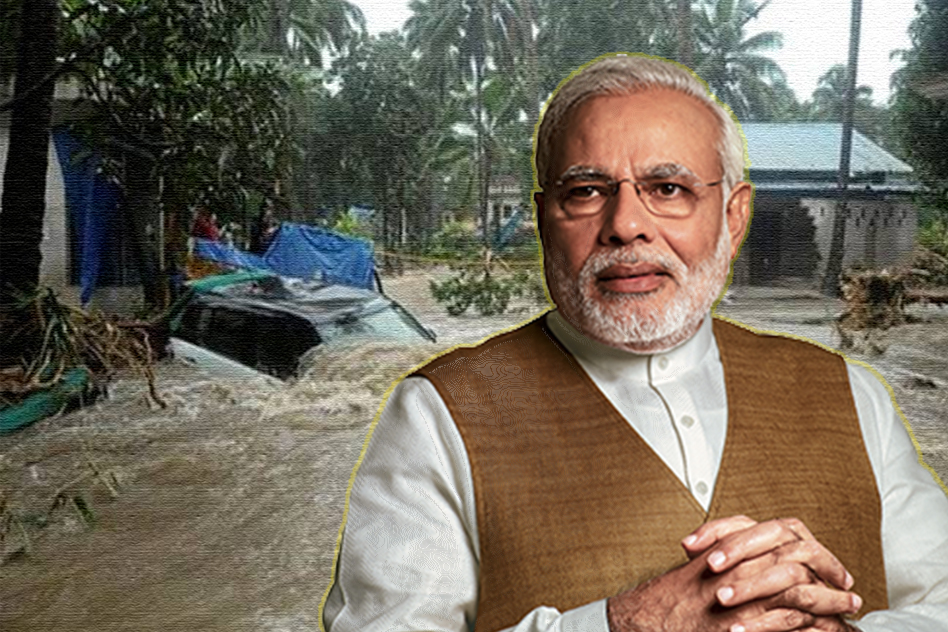
Why India Might Refuse 700 Cr Aid From UAE For Kerala
22 Aug 2018 8:40 AM GMT
As Kerala is struggling to find its ground after the devastating floods, financial aid and technical assistance have been pouring in from all corners of the country as well as from the world. One among those who have extended their support to the flood-ravaged state is United Arab Emirates (UAE).
UAE, Maldives, Qatar offer financial aid to Kerala
Kerala Chief Minister Pinarayi Vijayan on August 21 announced that Sheikh Mohammed Bin Zayed Al Nahyan, the crown prince of Abu Dhabi had called up Prime Minister Modi where he made an offer of financial assistance worth Rs 700 crore to help rebuild the state of Kerala. In a series of tweets, the CM also expressed his gratitude for the gesture. The governments of Maldives and Qatar too, have pledged to send financial aids to Kerala.
CM Pinarayi Vijayan informed that the United Arab Emirates will provide Kerala an assistance of ₹700 Crore. Kerala has a special relationship with UAE, which is a home away from home for Malayalees. We express our gratitude to UAE for their support. #KeralaFloodRelief pic.twitter.com/yfwbt9iEkd
— CMO Kerala (@CMOKerala) August 21, 2018
Interestingly, Prime Minister Modi thanked and expressed his gratitude to Sheikh Mohammed bin Rashid Al Maktoum, Vice President and Prime Minister of UAE in a tweet on August 18.
A big thanks to @hhshkmohd for his gracious offer to support people of Kerala during this difficult time. His concern reflects the special ties between governments and people of India and UAE.
— Narendra Modi (@narendramodi) August 18, 2018
The Indian expatriate community living and working in UAE is very large. Those living in UAE have been trying to help their home state with various kinds of assistance.
Why India might not accept foreign financial aid?
However, media reports suggest that India is most likely to decline any foreign financial aid for flood relief operations in Kerala. Reportedly, this is because of a policy that the UPA-I government had undertaken after the 2004 tsunami disaster. On December 2004, PM Singh famously said, “We feel that we can cope with the situation on our own and we will take their help if needed.”
According to government sources quoted by The Indian Express, the tsunami was a “watershed moment” of India’s foreign aid policy and since then, the subsequent governments have been systematically declining foreign financial assistance. However, the policy is not applicable to private contributions that have been pouring in from all over the world.
Until the 2004 tsunami, the Indian government had accepted financial assistance from foreign governments during the Uttarkashi earthquake (1991), Latur earthquake (1993), Gujarat earthquake (2001), Bengal cyclone (2002) and even the Bihar floods (July 2004). However, India’s change in stance has widely been viewed as a proclamation of the country’s self-worth. It is also an indication of India’s economic clout as the country has been providing aids to others.
Over the past 14 years, India had declined financial assistance from countries like the USA, Japan and Russia during the Kashmir earthquake of 2005, Uttarakhand floods of 2013, and Kashmir floods in 2014. Reportedly, Indian missions abroad have been asked to politely inform their host countries that no assistance is required and express gratitude as well.
Kerala needs economic assistance
Even though the water in Kerala has started to recede, what lies ahead for the state government is the momentous task of rebuilding it. With widespread destruction looming large over 13 or 14 districts of the state, the chief minister has earlier mentioned that the damages are over Rs 20,000 crores. After taking an account of the havoc in Kerala, the centre on August 21 released Rs 600 crore to Kerala in addition to waiving custom duty and GST on relief materials that have been imported.
Additionally, the chief minister has also demanded Rs 2600-crore MGNREGA special package for central schemes. Criticising the Modi government, Communist Party of India (Marxist) General Secretary Sitaram Yechury on August 18 had tweeted that what the central government has given as relief fund is insufficient for urgent relief and rescue funds.
Kerala has suffered a loss of nearly ₹ 20,000 cr in these floods. The state had sought an *immediate* assistance of ₹ 2000 cr from the Centre. What Modi has given is grossly insufficient for urgent rescue, relief and rehabilitation work. #KeralaFloods
— Sitaram Yechury (@SitaramYechury) August 18, 2018
Reportedly, Congress MP Shashi Tharoor has also visited the United Nations headquarters in Geneva to ask for assistance in the Kerala floods.
Also Read: The Various Ways You Can Help Kerala Flood Victims
 All section
All section













